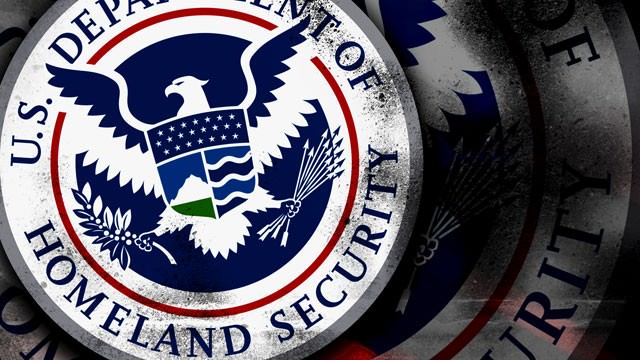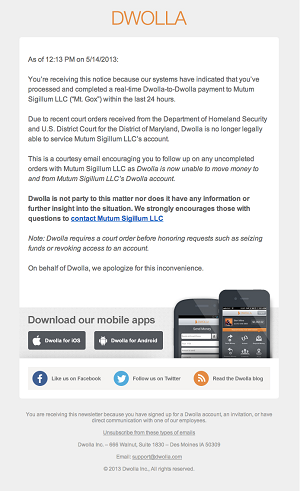
Homeland Security stops Dwolla transactions with Mt. Gox
Users of the online payment network Dwolla began reporting Tuesday afternoon that an order from the US Department of Homeland Security (DHS) was preventing them from transferring funds to and from Japan-based Mt. Gox, the world's largest bitcoin exchange.
As of press time, Dwolla had not responded to an email inquiry from CoinDesk. Nor was there any information regarding the order on the DHS website.

Dwolla Screen Shot 2013-05-14 at 3.40.00 PM
Several hours after word of the court order began spreading online, Dwolla had still not posted any news about the situation on its website, Twitter feed or Facebook page. However, numerous users on the Bitcoin Forum and other sites posted a copy of the email they said they had received from Dwolla.
The email (see accompanying screenshot) stated:
"As of 12:13 PM on 5/14/2013:
"You’re receiving this notice because our systems have indicated that you’ve processed and completed a real-time Dwolla-to-Dwolla payment to Mutum Sigillum LLC (“Mt. Gox”) within the last 24 hours.
"Due to recent court orders received from the Department of Homeland Security and U.S. District Court for the District of Maryland, Dwolla is no longer legally able to service Mutum Sigillum LLC’s account.
"This is a courtesy email encouraging you to follow up on any uncompleted orders with Mutum Sigillum LLC as Dwolla is now unable to move money to and from Mutum Sigillum LLC’s Dwolla account.
"Dwolla is not party to this matter nor does it have any information or further insight into the situation. We strongly encourages those with questions to contact Mutum Sigillum LLC.
"Note: Dwolla requires a court order before honoring requests such as seizing funds or revoking access to an account.
"On behalf of Dwolla, we apologize for this inconvenience."
Mt. Gox issued a statement on both its website and Facebook page. The Facebook statement read:
Several posters on the Bitcoin Forum speculated the court order might have something to do with a federal lawsuit filed against Mt. Gox by CoinLab earlier this month. However, CoinLab's complaint was filed in Washington state, while the email to customers from Dwolla refers to the US District Court in Maryland.
Tuesday's developments also revived questions raised in 2011 about "Mutum Sigillum LLC". In its email to customers, Dwolla noted it is "no longer legally able to service Mutum Sigillum LLC's account."
Based in Newark, Delaware, Mutum Sigillum appears to have a relationship with Mt. Gox -- possibly as a partner of some kind allowing the Japan-based exchange to operate as a money business in the US, Bitcoin Forum members have theorized.
The Mutum Sigillum website shows no sign of any activity since April 1, 2009, when an update was posted reading, "New service currently being beta-tested, more news coming soon." The only other news item appearing on the home page refers to the Swell Project, a site that also appears to have been dormant for some time (with no updates since August of 2010).
To add yet another odd note to the circumstances, "Mutum Sigillum" means "dumb seal" in Latin.
Both Dwolla and Mt. Gox have been mentioned recently in the Department of Homeland Security's "Daily Open Source Infrastructure Report." Dwolla was named in an April 1, 2013, report about a distributed denial of service (DDoS) attack on the company on March 27; the report also mentions a March 29 DDoS attack on Mt. Gox. Two other reports -- one on April 5 and one on April 15 -- refer to an April 4 DDoS attack on Mt. Gox and the exchange's April 11 temporary shutdown following a massive drop in bitcoin prices and a spike in trading.
DISCLOSURE
The leader in news and information on cryptocurrency, digital assets and the future of money, CoinDesk is a media outlet that strives for the highest journalistic standards and abides by a strict set of editorial policies. CoinDesk is an independent operating subsidiary of Digital Currency Group, which invests in cryptocurrencies and blockchain startups. As part of their compensation, certain CoinDesk employees, including editorial employees, may receive exposure to DCG equity in the form of stock appreciation rights, which vest over a multi-year period. CoinDesk journalists are not allowed to purchase stock outright in DCG.

